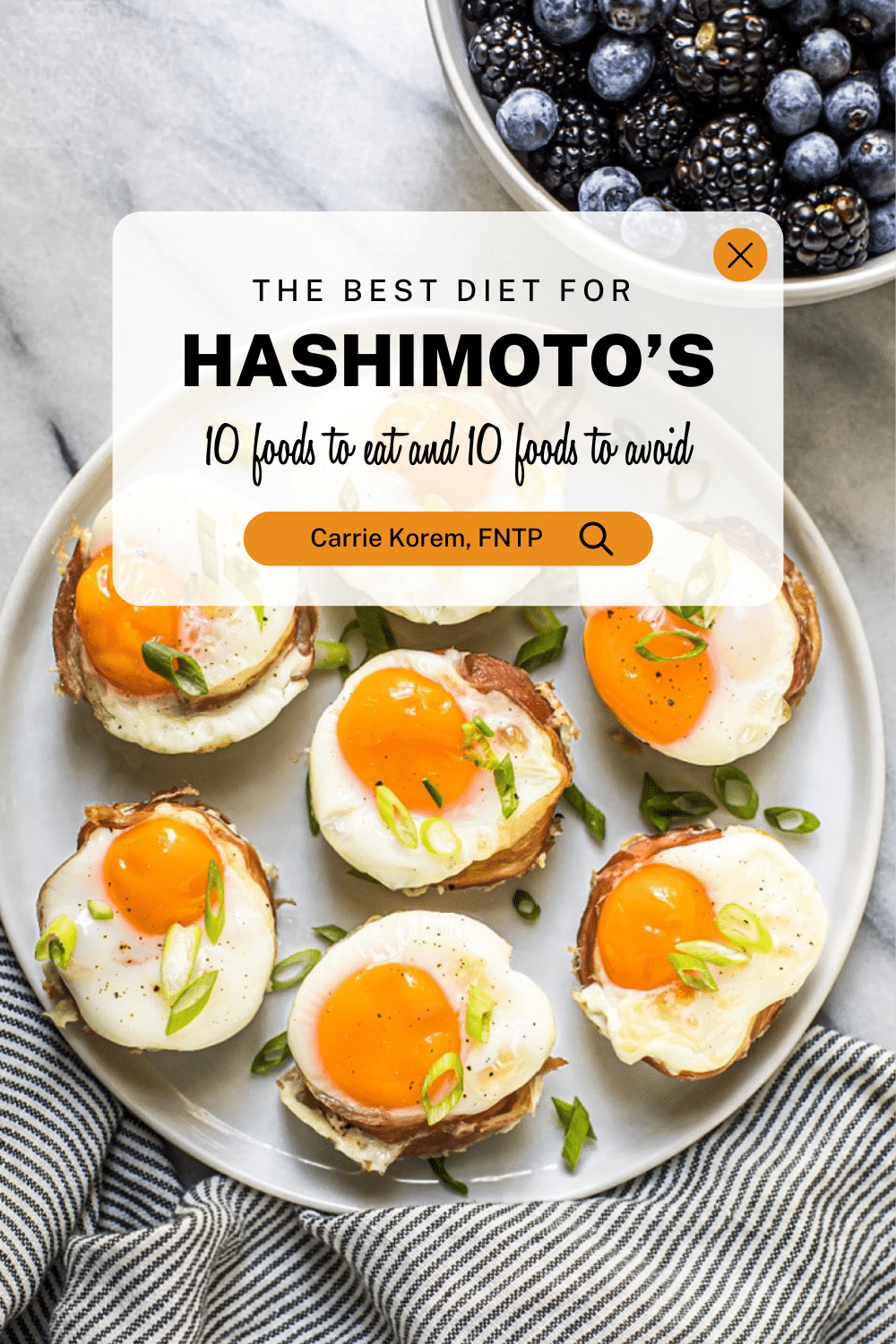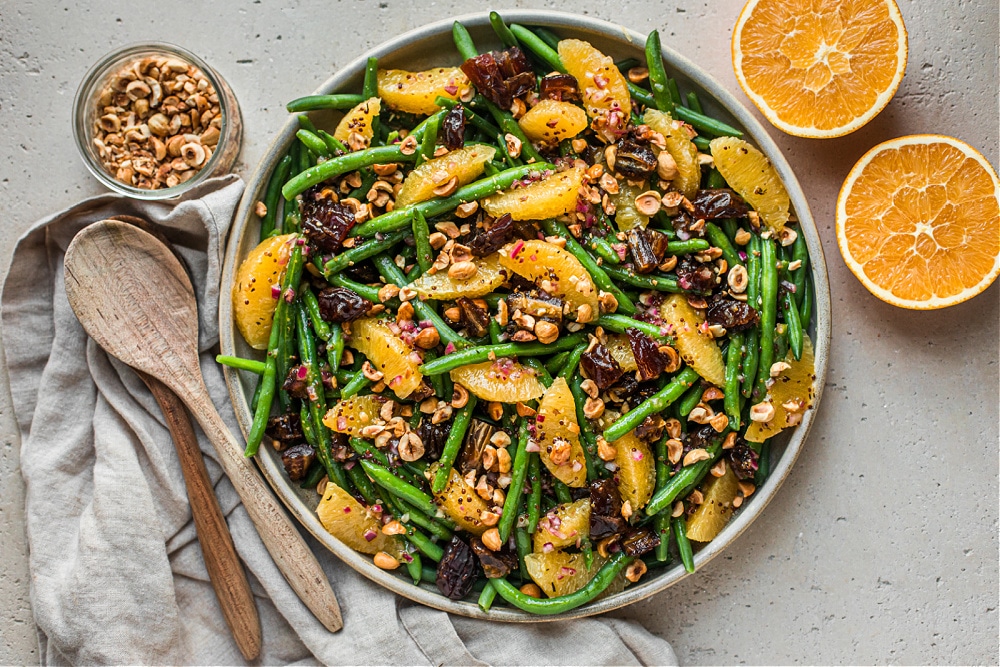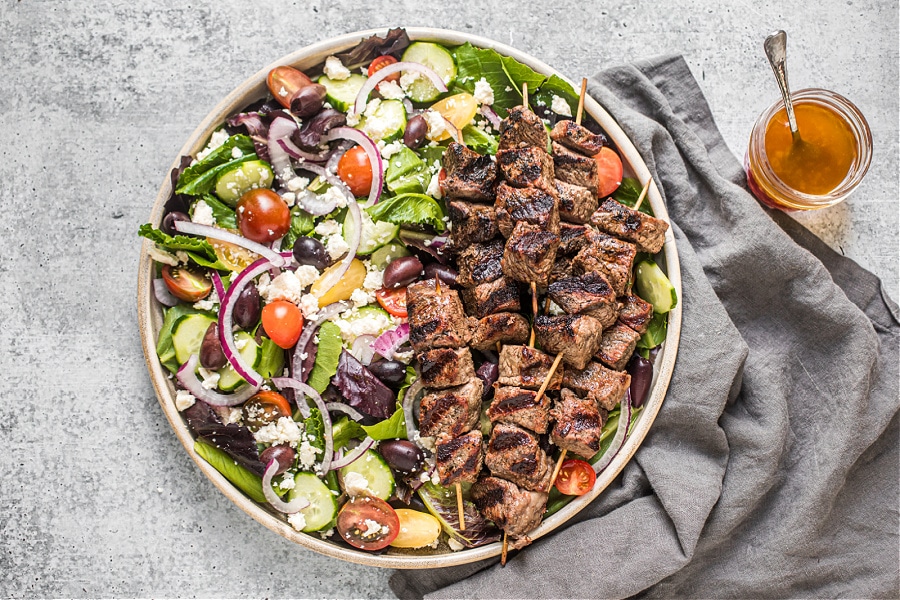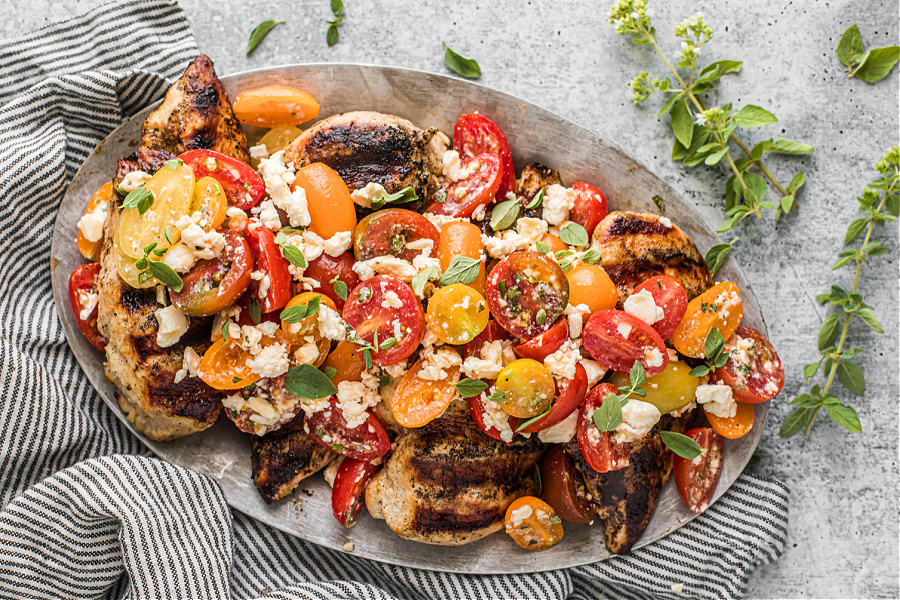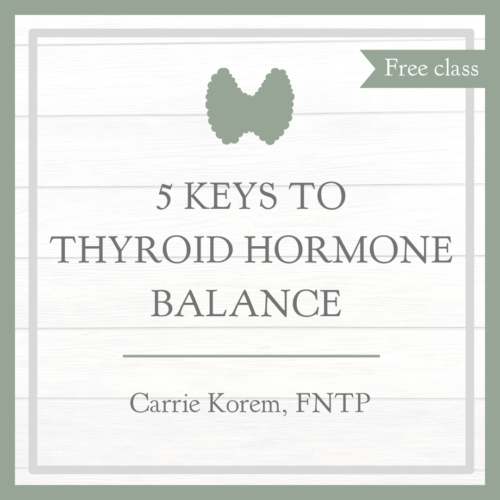Diet plays a huge part in Hashimoto’s and in thyroid disease in general. Thankfully there are so many ways you can improve thyroid function and balance hormones using food. Let’s walk through the best diet for Hashimoto’s so you can best support your thyroid and immune system!
What is Hashimoto’s
Hashimoto’s is an autoimmune disorder where the immune system makes antibodies that attack the thyroid tissues. As the immune system attacks the thyroid, it can cause either low thyroid hormones (hypothyroid) or sometimes high thyroid hormones (hyperthyroid).
It’s important to understand that Hashimoto’s is an immune system issue that can affect the thyroid. But, it’s not inherently a thyroid issue.
Hashimoto’s disease is also known as Hashimoto’s thyroiditis, chronic lymphocytic thyroiditis and chronic autoimmune thyroiditis.
Can diet help people with Hashimoto’s?
Absolutely! The best way I can describe it is that the foods we eat, give the cells of our body the tools that it needs to function.
The cells of our body make up the tissues. The tissues make up the organs. And, the organs make up the systems of the entire body.
If you are providing your cells with the nutrients they need to function well, then the body will be well. So yes, your diet can make a massive impact on the health of your body and especially when it comes to Hashimoto’s.
Do I Need to be on a Restrictive Diet to Heal?
So many people believe that you need to go on a super restrictive diet when you have Hashimoto’s. But, the problem with this is that when we remove healthy foods such as raw or cultured dairy, pastured eggs, animal foods, carbs, beans, etc. the severe restriction is just too stressful on the body.
I cannot tell you how many clients I’ve worked with who were eating AIP, carnivore, keto, doing intermittent fasting, etc. and once we went back to adding in more foods and eating regular meals their symptoms such as anxiety, stubborn weight, insomnia, blood sugar imbalance, etc. went away.
It’s so important to remember that we need to nourish to heal, not restrict.
Which nutrients are important for those with Hashimoto’s?
Zinc
Zinc is needed for TSH production and for the conversion of FT4 to FT3. The RDA for zinc is 8-11mg for adults, depending on age and gender.
Best Food Sources of Zinc:
Pastured meats
Organic eggs
Cultured dairy
Oysters
Foods like soaked chickpeas, lentils and pumpkin seeds also contain zinc, but it’s very difficult to get enough daily zinc from these plant foods. I always recommend that my clients eat some pastured animal foods daily to get the recommended amount.
Recommended Zinc Supplementation:
Zinc Liver Chelate is a good choice. Remember, zinc and stomach acid work synergistically together, so if you find you’re continually deficient in zinc, ensure your body is making enough stomach acid.
Iodine
Iodine is present in every organ and tissue in the body. It’s not only necessary for proper thyroid hormone production, but it’s also needed for fetal development, the health of the salivary glands, proper immune system function, hormone balance, healthy breast tissue, the prostate, ovaries and skin.
If you don’t have enough iodine in the body, you cannot make enough thyroid hormones, in particular FT4, which can lead to hypothyroidism.
Additionally, iodine plays a significant role in the liver’s ability to convert FT4 to the active thyroid hormone FT3. When the body doesn’t convert enough FT4 to FT3, this can also lead to hypothroidism.
Iodine deficiency can also cause goiters, and contribute to thyroid cysts and nodules.
While the RDA is 200mcg, most thyroid experts believe this is too low. Many medical doctors who specialize in thyroid health, such as Guy Abraham, M.D. and David Brownstein, M.D., recommend amounts anywhere between 12.5 – 37.5 mg daily.
In our practice, we’ve found that doses closer to 600mcg – 6mg daily are well tolerated. However, it’s important to remember that we are all biochemically individual, so what works for one person doesn’t necessarily work for another.
The body doesn’t make iodine, so it’s essential to include it as part of your diet.
If you have elevated fT4 or fT3, then you should talk to your nutritionist about the right amount of iodine-rich foods that your body needs. Or, if you have Hashi’s and you’re concerned that it may cause negative symptoms, this article, and this video, will help clear things up for you.
Here’s a list of the amount of iodine in various foods for reference (according to the NIH):
Seaweed, nori, dried, 10g or 2 tablespoons 232 mcg
Cod, 3 ounces 158 mcg
Plain yogurt, 1 cup 116 mcg
Oysters, 3 ounces 93 mcg
Milk ~85 mcg (this various according to the season)
Egg 26 mcg
Cheese, 1 ounce 14 mcg
Liver 14 mcg
Shrimp, 3 ounces 13 mcg
Tuna, 3 ounces 7 mcg
As as you can see in this study, the amount of iodine in milk, fish, and eggs varies upon the geographical location. So, the numbers above are approximate.
Recommended Iodine Supplementation:
Iodomere and Promoline Iodine from Standard Process are two of my favorites. Iodomere contains less iodine than Promoline Iodine. Nascent Iodine is a good option as well and comes in liquid form. You can also add iodine to your diet with Dr. Cowan’s Sea Vegetables Powder.
If you feel you need supplementation, I always recommend consulting with a practitioner who is well-versed in nutrition to help you figure out the best dosage for your body.
Tyrosine
The thyroid combines tyrosine and iodine to make thyroid hormones, so it’s essential for proper T4, FT4, T3 and FT3 production. In fact, the “T” in the thyroid hormones stands for “tyrosine”.
Best Food Sources of Tyrosine:
Pastured meats (beef, chicken, pork, lamb, etc.)
Pastured eggs
Raw dairy
Wild fish
Cultured yogurt
Soaked almonds and lima beans
Recommended Tyrosine Supplementation:
It’s very important that you only take tyrosine if you’re truly deficient, because it can cause negative effects if you have too much. I recommend the book The Mood Cure to read more about supplementing with various amino acids.
Iron
The body needs iron to make TPO (thyroid peroxidase), which is then used to make the thyroid hormone FT4. When the body is deficient in iron, FT4 levels can drop, putting the body in a hypothyroid state.
You also need iron to convert FT4 to the active FT3, so low levels of iron can cause a decrease in FT3. This can lead to weight gain, low energy, etc.
It’s important to get iron-rich foods from animal sources daily. Yes, vegetables like spinach contain iron, but they aren’t the most bioavailable form, so it’s best to stick with heme sources of iron.
The RDA for iron is 8-18mg, depending on age and gender.
Best Food Sources of Heme Iron:
Liver
Pastured beef
Chicken
Game meats
Oysters
Pastured eggs
Recommended Iron Supplementation:
If you find that you are deficient in iron or have been diagnosed with anemia, often the issue isn’t too little iron in the diet, but too little stomach acid. Click here for more information. Taking a bunch of iron through food or supplements won’t solve the problem because the root issue is often that the body isn’t able to utilize the iron in food.
Selenium
Selenium is important for the conversion of FT4 to FT3 in the liver. It also helps to support the thyroid in making thyroid hormones. Studies have also shown that selenium can help reduce TPO antibodies and support the immune system.
The RDA for selenium is 55mcg for adults.
Best Food Sources of Selenium:
Brazil nuts
Tuna
Halibut
Sardines
Shrimp
Pastured beef
Liver
Chicken
Cottage cheese
Pastured eggs
Recommended Selenium Supplementation:
If you need a more therapeutic dose of selenium, Cataplex E is the one I use at my practice and that I trust.
Best Food Sources of Vitamin A:
Liver
Fatty fish
Raw dairy
Pastured meats
Cod liver oil
Recommended Vitamin A Supplements: If you would like to take supplements, I recommend Standard Process Cod Liver Oil or desiccated liver capsules. Both are good options.
B Vitamins
B vitamins such as Thiamin, Riboflavin and B12 help support the entire endocrine system.
B6 and B12 are especially calming for the nervous system, which helps balance the adrenals and, in turn, the thyroid. B vitamins also work with iodine to produce T4 and T3.
Oftentimes, those are who are hypothyroid are deficient in B12.
Best Food Sources of B Vitamins:
Pastured poultry and beef
Wild fish
Pastured eggs
Cultured dairy
Soaked legumes
Dark leafy greens
Recommended B Vitamin Supplements:
If you would like a supplement, Cataplex B is a really great option.
Magnesium
Magnesium is an essential mineral for thyroid function and for the conversion of T4 to T3. Studies have shown that low magnesium is associated with a higher risk of increased TgAB, and increases the prevalence of Hashimoto’s.
It’s important to understand that the first mineral you burn through when you’re stressed is magnesium. Oftentimes, you are getting enough magnesium in your diet, but the amount of stress in your life can be causing a deficiency.
The RDA for magnesium is 310-420mg for adults, depending on age and gender.
Best Food Sources of Magnesium:
Fatty fish
Leafy greens (make sure they are cooked!)
Soaked seeds, legumes and nuts
Avocado
Recommended Magnesium Supplements:
One of the cheapest ways to get extra magnesium into your system is with an Epsom salt bath. Put 1 cup of Epsom salt in a warm bath and soak for 20 minutes. The magnesium will soak into the body via the skin. If you’re looking for extra magnesium in pill form, I recommend E-Z Mg by Standard Process.
Vitamin D
Vitamin D is necessary for iodine to be used to create thyroid hormones. Without adequate Vitamin D, you will often see a decrease in FT4 and/or FT3, leading to hypothyroidism.
Several clinical studies have reported low Vitamin D in those with Hashimoto’s or Graves’ disease, indicating an association between Vitamin D deficiency and thyroid autoimmunity.
Impaired Vitamin D signaling has been reported to encourage thyroid tumorigenesis.
Vitamin D deficiency has been strongly associated with higher TSH levels (aka hypothyroidism).
Vitamin D regulates insulin and balances blood sugar. When blood sugar is imbalanced, this can cause thyroid hormones to go off balance.
The RDA for Vitamin D is 15mcg.
Best Food Sources of Vitamin D:
- Pastured egg yolks
- Pastured butter
- Grass fed beef
- Liver and organ meats from pastured animals
- Raw milk
- Raw cream
- Oily fish (mackerel, tuna group, herring, anchovies, wild salmon, sardines, herring)
- Cod liver oil
- Animal fat from pastured animals (such as butter, ghee, lard, tallow, or duck fat)
As you can see the foods you eat play a huge role in thyroid hormone production and balance!
The best diet for Hashimoto’s – 10 Foods to eat:
1. Lots of Vegetables – While there’s no limit to your vegetable consumption, I do recommend that most of the vegetables you consume are cooked in healthy fats such as butter, ghee or coconut oil.
Since most people with thyroid disease also have digestion issues, cooking the vegetables instead of eating them raw helps make digestion easier.
Cooking also helps reduce goitrogens (in vegetables such as kale, Brussels sprouts, etc.) which can inhibit the uptake of iodine into the thyroid.
2. Pastured Butter and Animal Fats – Butter contains omega-3s, a highly absorbable form of iodine, and vitamin A, which are all crucial for proper thyroid function.
Animal fats such as ghee, lard, tallow and duck fat contain healthy cholesterol (you need cholesterol for hormone production and a healthy immune system), vitamins A, D, E and K, and omegas which are all needed for a healthy body.
I recommend eating about 2-3 teaspoons of animal fat at each meal. Cooking vegetables and meats in butter is an easy way to get this nutrient-dense fat in your diet.
If you’ve been using mostly avocado oil and olive oil, I recommend putting those on the shelf right now and really leaning into animal fats. My clients see a huge improvement in symptoms when they make this switch!
3. Zinc-Rich Foods – Foods such as oysters that are rich in zinc are excellent for thyroid balance. Zinc is needed for TSH production and for the conversion of FT4 to FT3. It’s also needed to create proper amounts of stomach acid, which enables the body to utilize the nutrients in your food. Other foods rich in zinc are pastured beef, chicken and lobster.
4. Wild seafood and sea vegetables – The thyroid needs iodine to make thyroid hormones, and wild seafood and sea vegetables are both great sources of iodine. If you don’t live near the ocean, stores like Trader Joe’s, Whole Foods and Costco have good selections of wild frozen seafood.
Some of my favorite sea vegetable powders are:
Dr. Cowan’s Sea Vegetable Powder
Maine Coast Sea Vegetables Kelp Powder
I’m not suggesting that one eats large quantities. One serving of fish, or a sprinkling of some kelp or sea vegetable powder is a good way to include these foods in your diet. Overconsumption isn’t a good way to go.
Please note: If you have elevated fT4 or fT3, then you should talk to your nutritionist about the right amount of iodine-rich foods that your body needs. The body needs iodine for more than just thyroid hormone production, but if you are make too much thyroid hormone, then eating too much iodine can possibly create further hyperthyroid issues.
Or, if you have Hashi’s and you’re concerned that it may cause negative symptoms, this article will clear things up for you.
5. Pastured Meats – Meats such as beef, chicken, turkey, game, and organ meats contain vital nutrients such as Vitamin A, folate, Riboflavin, B6, B12, Magnesium, and zinc, which are all important for proper thyroid hormone balance.
6. Meat Stock – Meat stock, rather than bone broth, is a good food to be consuming during the early stages of healing the gut and balancing the thyroid. Stock is especially rich in gelatin and free amino acids like proline and glycine. These amino acids, along with the gelatinous protein from the meat and connective tissue, are particularly beneficial in healing the connective tissue in the lining of the gut.
Bone broth is different from meat stock because it’s cooked longer and contains higher amounts of various amino acids. I recommend only drinking meat stock for the first 4-6 months and then switching to bone broth.
Here’s some independent testing done on both meat stock and bone broth, and you can see the results here and read more about the differences between the two. For a simple meat stock recipe, click here.
7. Organic, Pastured Eggs – Eggs contain about 16% of the iodine and 20% of the selenium needed in one day. I realize that most elimination diets restrict the consumption of eggs, but in our practice, we’ve found that unless someone has a documented egg allergy, pastured eggs can often be an important part of a thyroid healing diet.
If you’ve had testing done and have an intolerance to eggs, I suggest just giving the egg yolks a try. Most people actually react to the white and not the yolk.
8. Cultured and/or Raw Dairy – Dairy is another food that has gotten a bad reputation in recent years. Of course, we always want to stay away from factory-farmed and processed dairy, but cultured and/or raw dairy can be a healthy part of a thyroid-healing diet. These foods are rich in omega-3, Vitamin A, Vitamin D, Magnesium and B Vitamins.
Here are some examples of cultured and/or raw dairy:
Kefir
Organic yogurt
Cultered butter
Cultured sour cream (Walaby is a great brand!)
Raw milk (search here for local sources)
Raw cheese
Of course, if you have a documented allergy to dairy, then avoid it’s best to avoid that food.
9. Fermented Vegetables – Just 1 tablespoon of fermented vegetables such as sauerkraut contains millions of probiotics. It’s a wonderful food to add to each meal to help build up healthy flora in the gut. You can make sauerkraut at home (it’s actually very easy!), or purchase at your local health food store. A good one to get started with is the dill pickle kraut from Farmhouse Culture. This is great food for the kids to eat as well!
10. Soaked Nuts, Seeds, Legumes and Lentils – All of these foods are good options, but they do need to be properly prepared (aka soaking, spouting, fermenting, etc.).
Before I list the foods to avoid, let’s remember not to get focused on this list. Educate yourself on the foods to avoid, but then focus on the foods you can eat. This will help take some of the stress out of the process!
The best diet for Hypothyroidism – 10 Foods to Avoid:
1. Soy – Soy isoflavones inhibit the enzyme thyroid peroxidase (TPO) that plays a key role in thyroid hormone synthesis, and they also interfere with thyroid hormone production. Soy has also been shown to elevate TSH, so it’s best to avoid soy, especially if you already have a documented thyroid imbalance.
2. Processed Foods and Sugars – Processed foods and sugars create hormone imbalance, increase inflammation, and are terrible for proper gut and thyroid healing, so all processed foods should be avoided when someone has thyroid disease.
3. Raw Goitrogenic and Cruciferous Vegetables – Goitrogens are compounds that interfere with the normal functions of the thyroid gland. They can block iodine from getting into the cells of the thyroid, interfere with the production of TPO (which is needed to make T4) which can lead to or contribute to hypothyroidism.
Thankfully, you don’t need to avoid these foods all together, but instead just make sure to eat them cooked since cooking reduces the goitrogens.
Here’s a quick list for you:
Bok Choy
Broccoli
Brussels sprouts
Cabbage
Cassava
Cauliflower
Collard Greens
Kale
Millet
Mustard Greens
Rapeseed (aka Canola)
Rutabagas
Spinach
Turnips
4. Unsoaked Nuts, Seeds, Legumes, and Grains – While nuts, grains, seeds, legumes and grains are healthy foods, they do contain anti-nutrients that need to be reduced so they don’t rob your body of minerals when consumed. Here’s an article I wrote on this topic with exact directions on how to properly prepare these foods.
5. Gluten (and consider also avoiding grains) – Anyone with autoimmunity also has some kind of gut issue and it’s usually in the form of leaky gut. This issue enables gluten to enter into the bloodstream via the “leaky” walls of the small intestine. When this happens, the immune system launches an attack and your thyroid tissues can get caught up in the crossfire.
If you want to help speed up the healing process, I do recommend avoiding all grains from your diet. Grains that aren’t soaked, fermented or sprouted contain physic acid and can rob the body of minerals and are also hard on the digestive system. They can raise and cause imbalance in blood sugar levels. And, most people who have Hashimoto’s are also dealing with some kind of blood sugar imbalance. Blood sugar swings raise stress and inflammation in the body and can alter the gut microbiome. So, eliminating grains helps reduce the inflammatory side effects.
I avoided all grains during my healing process and found it very beneficial. I have so many grain-free recipes for you to use, if this is something you want to try!
Does this mean you need to avoid gluten or grains for the rest of your life? Not necessarily. In our practice, we’ve found that once the client takes steps to heal the gut and antibodies are back to optimal, then often properly prepared foods such as fermented sourdough bread can often be added back.
Of course, talk to your practitioner before you try any foods like this, but I do want to give you hope that one day you might be able to bite into a piece of crusty bread again!
6. Processed Fats and Oils – margarine, vegetable oil, canola oil, corn oil, soy oil, etc. These oils and fats are highly processed and promote inflammation in the body.
7. Non-Organic and Conventionally Grown Foods – Pesticides are known to cause thyroid hormone imbalance, so it’s best to avoid as many conventionally-raised foods as possible. If you don’t know where to start, start with the foods you eat most often and then work from there.
8. Processed Dairy – Pasteurized and homogenized dairy is actually a processed food! To make matters worse, synthetic vitamins such as A and D are added back to the milk because they are destroyed during processing. Conventional, processed dairy causes inflammation and shouldn’t be part of a healing diet.
9. Alcohol – Unfortunately, alcohol and caffeine are liquid stress for the adrenals, which have a huge impact on the thyroid and immune system, so it’s best to avoid them as much as possible.
10. Caffeine – As with alcohol, caffeine is also liquid stress for the adrenal, which has a negative effect on thyroid health. If you drink a lot of caffeine right now, I recommend taking steps to slowly reduce your consumption. Here are some easy steps to take to reduce your coffee intake. I also have a coffee substitute that’s pretty darn good!
If you’re looking for recipe inspiration, I’ve got hundreds of them for you right here!
If you’d like to learn some first steps you can take to help support your thyroid, check out my class, “5 Keys to Thyroid Hormone Balance”. It’s just 45 minutes and I promise you’ll learn something new!


